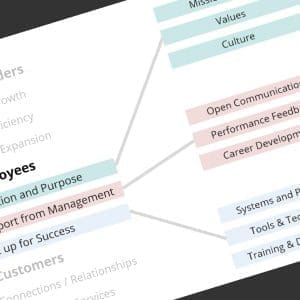Focus on a better definition of Success - one that delivers results. Quantifiable change, improved operations, smarter people, profitable top line growth - there is a big difference between deliverables and meaningful results.
When most people talk about projects they are working on, the common definition of Success can be summarized with one simple word …
Done …
The lawn is mowed.
The dishes are clean.
The clothes are put away.
I’ve read the book.
I’ve written the book report.
… seems to work around the house …
Done.
I’ve loaded the copier.
I’ve scheduled the meeting.
I’ve received all of the shipments.
The books are closed.
The ledger is balanced.
So far so good … looks like this works at work. But so far, we’re only talking about tasks – chunks of work with a neat, finite end point. What about …
I’ve made my sales calls …
I’ve documented the process …
I’ve written the program …
I’ve completed the spreadsheet …
I’ve done the analysis …
Done?
Are these really done? A better question might be – are these tasks that have ended, or tasks that are part of a bigger objective …
I’ve made my sales calls ... now the orders will start coming in.
I’ve documented the process ... now others will be able to do these tasks without me.
I’ve written the program ... now it will perform as the user expects.
I’ve completed the spreadsheet … now others will be able to extend the model.
I’ve done the analysis … now it will correctly answer the questions we built it for.
Does it really matter that you made the calls if they didn’t get the sales? Not really; if you want to consider yourself a successful telesales rep, you will learn how you sound over the phone, adjust the message and the tone to put the caller at ease, do your homework before the call to have the background information ready, etc.
Does the documentation you produce matter if no one understands what you are saying? Not really – so you work on your style, and ask your readers for feedback – what is clear, what is not clear.
Does the spreadsheet add value if no one else can use it? Well, maybe you are just creating a tool to make your own life easier. But imagine if you could design a financial model that all of your peers could drive value with? A rising tide lifts all boats …
Let’s back the camera up even more, for a really wide view. Say you are rolling out a major application, or designing a comprehensive training program, or implementing a new organization model, or developing a new product offering. Are you successful when the task is done? I don’t think so …
… it only counts when people can use the system – and use it to great effect – over the long term … even when there is turnover, and the folks that were here for go-live are replaced with a bright new team eager to learn the [for them] new processes and be as productive as the last team …
… it only counts when people can learn about the new program, sign up when it fits in their schedule, take the course, and apply the knowledge to create more value …
… it only counts when people understand the new way of doing things, can make the transition, and then can sustain the new methods through the inevitable growing pains as we “work the bugs out” …
… it only counts when you can generate sustainable, profitable new revenue – you have connected with the customer, solved a valid need, and convinced them to actually pay your invoices …
Change the Definition of Success
We started out with an oversimplified definition of Success; “I have delivered the report / program / document” equates “success” with “milestone achieved”.
I want folks to focus on better definition of Success – one that delivers results – quantifiable change, improved operations, smarter people, profitable top line growth. There’s a big difference between deliverables and results – but results are what the check signers are asking for …
18 August, 2014






Comments (0)